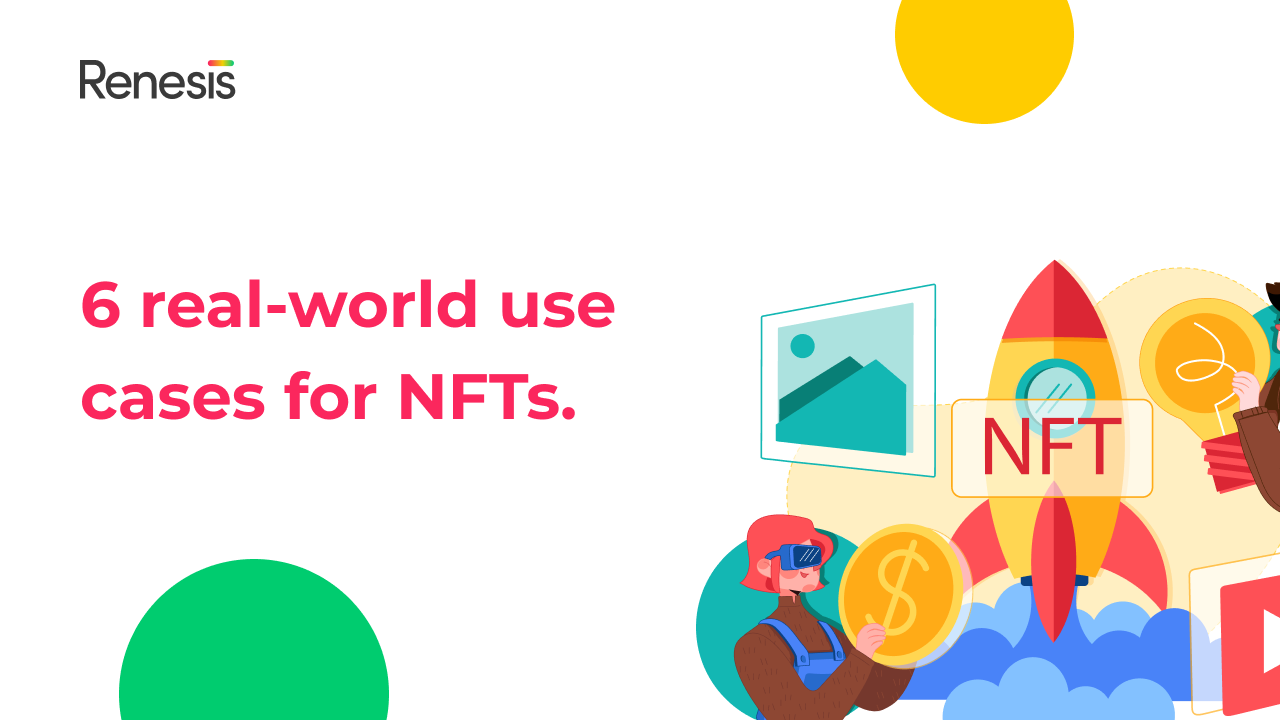6 real-world use cases for NFTs
NFTs are shaping the future of ownership in just about every aspect of life, and they can’t be ignored. It’s not surprising that we’ve been swamped with requests and questions about how NFTs can be used for brand marketing.
In spite of their immense challenges, NFTs are becoming increasingly popular as a way to monetize digital assets and intellectual property. Meanwhile, NFTs are also considered effective tools for verifying physical asset authenticity on the blockchain.
For a comprehensive understanding of NFTs, it is imperative to consider non-fungible token use cases.
In this blog post, we will explore the top known use cases of NFTs, emphasizing their role in demonstrating ownership in the real world, applying scarcity principles to the digital world, and adding value to brands!
6 real-world use cases for NFTs
1. Music & Social Media
When you ask ‘what are the use cases of NFTs?’ will obviously take you to the world of music. With NFTs, content creators can remove intermediaries between their followers and fans. In addition, NFTs can be a useful tool for creating unique shopping experiences for consumers.
An artist could, for instance, sell 100 copies of their latest single as NFTs at auction. The highest price would be paid by buyers for access to these exclusive pieces of music.
2. Gaming
NFTs make the most sense in the gaming sector, even though most of the focus has been on the art and entertainment sectors. Over 2.7 billion people worldwide play online games, so digital collectibles are nothing new.
Many gaming ecosystems encourage players to unlock special in-game items and accessories that can be traded in-game or sold for real money, creating thriving economies in online gaming.
Unlike other kinds of items, NFTs can be verified for history, authenticity, and origin, which is another valuable quality for players.
3. Real Estate
With their ease of use and ability to prove ownership, NFTs could revolutionize the real estate industry.
It is common to encounter layers of intermediaries in real estate transactions, from estate agents and banks to notaries and solicitors, all of whom increase the cost of what should be a simple transaction.
Using NFTs, we could drastically reduce the amount of time it takes to buy a property by eliminating these intermediaries and substituting smart contracts that make the transfer of ownership easy and safe. A blockchain records and verifies all ownership and rights history instantly and easily.
Additionally, NFTs may be able to provide fractional ownership in properties, enabling owners to quickly unlock value from previously illiquid assets and raise funds without having to go to a bank. Besides having a great effect on the real estate industry, it could have a large impact on the traditional banking sector as well.
4. Digital Fashion
There have been many luxury brands that have expressed confidence in the potential of NFTs, including Louis Vuitton, Gucci, and many others. For fashion brands, NFTs are a vital tool for promoting their brands. Leading fashion brands could strengthen customer trust by utilizing the distinct characteristics of NFTs.
Using NFT in the fashion industry could also lead to improved product authenticity safeguards. As a result of counterfeit products, renowned luxury brands lose millions of dollars and their reputations. The NFTs ensure that customers have access to the original products of brands they buy.
5. NFTs Art
Due to their scarcity and uniqueness, NFTs are “reshaping the landscape of digital art,” according to Sotheby’s auction house. Having secure access to your work online is crucial, especially in an age when content is freely shared and copied online.
By using the blockchain’s immutable ledger technology, NFTs allow online assets to have verifiable scarcity and original ownership. Artists are able to monetize their businesses through a breakthrough in the fight against creative theft and plagiarism.
6. Goods & Supply Chain
In the goods & supply chain industry, blockchain can be an effective technical support. Amazon, for instance, has already begun using blockchain to trace its products’ journey from point of origin to point of sale.
Blockchain’s transparency and immutability make it an ideal solution to the question ‘what are the use cases for NFT?’ for the logistics sector. Data in the supply chain is reliable and authentic because they are transparent and immutable. Increasingly, consumers are aware of the storage locations and duration of perishable goods.
By using NFT in the goods and supply chain management sector, unique products can be represented. You can use NFTs to track products if you have metadata about their origin, journey, and warehouse location.
NFT use cases can improve productivity across a wide range of industries. In addition, NFTs are a powerful tool for transforming asset management and perception.
Due to their unique representation of physical and digital goods on a blockchain, NFTs provide a wide array of valuable benefits. Consider NFTs’ basics and attributes to understand how they are unique tools!










